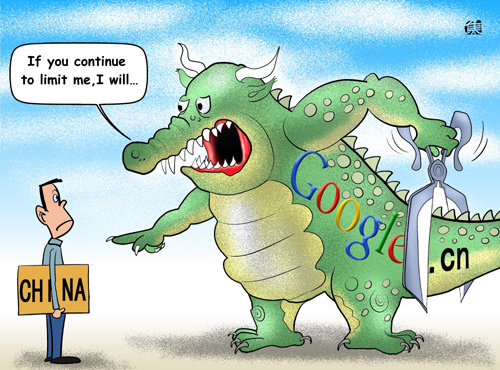
 |
| Google Gator (By Jiao Haiyang/China.org.cn) |
Contrary to the notion that China is an enemy of the Internet, and vice versa, there is increasing evidence that Chinese netizens, the largest online community in the world, and the government alike, are embracing the Internet in a lasting and constructive way.
The question of sovereignty and cyberspace is not an either or proposition, but a yin-yang dialectic; China is changing the Internet and the Internet is changing China.
The result won't look exactly like the Internet in the United States or Japan - why should it? - but it will by necessity sustain a very high degree of free information flow, which means tolerance for diverse views, while at the same time taking at least limited regulatory measures against hate speech, jingoism, libel, virtual lynching and so on.
The challenge is to get the balance just right, like harnessing a horse in a way that respects the integrity of the horse and does not impede its power, grace of movement or speed but allows for a modicum of guidance.
In terms of governance, the Internet in China has already introduced a number of positive developments. While the "voice of the people" as heard on the Net is not strictly democratic or statistically representative, it is a collective voice that bears paying attention to. At the same time, segments of the population without Internet access, or those disinclined to use it, need to be taken into account as well.
Another boon of a freewheeling Net is giving citizens a virtual town square or place of petitioning where grievances and miscarriages of justice can get the attention they deserve. Positive lessons can be drawn from the recent protests over land rights and incompetent governance that have gained enough traction on the Internet to bring about judicious intervention from responsible authorities.
Perhaps the most immediately useful aspect of a vigorous Internet in China is the uncanny speed and wealth of detail it brings to exposing corruption and official misdeeds across the vast and less than easily accessible reaches of the world's most populous country. With information coming in from all points and all points of view, on a shared platform viewable by all, potential calamities can be addressed, if not nipped in the bud, and looming problems can get a fix before tumbling out of control.
The lingering perception among American triumphalists that the Internet would be the ruin of the Communist Party of China's governance is completely wrong. Instead, the Internet is proving to be a boon to the CPC, and it is helping to improve governance and promote stability.
Fits and starts, notwithstanding, what has emerged from the dialectic interaction of the State with this "democratizing technology" is the creation of an interactive feedback mechanism that serves to make government more transparent and efficient while validating policy that is in tune with popular needs. It creates instant and accessible pathways for the ruled and rulers to communicate back and forth.
If doubts remain about the wisdom of embracing the Silicon Valley's gift to the world, it is partly to blame on the Internet evangelism of people like US Secretary of State Hillary Clinton who have a habit of hectoring other countries into following the American way.
Yet it is within China's right as a sovereign nation to say: "No thanks, Google, no thanks, Facebook. Your technology is cool, your algorithms are awesome, but the way you sell private and personalized information is not so cool. The way you share information and cooperate with your government is understandable, but not so cool for us. Our cyber domain is open, but not open to heavy-handed domination by you."
Just as there is Washington consensus versus the Beijing consensus when it comes to political and economic development, there is emerging a duality in how to approach information manipulation and dissemination. Call it Google versus Baidu, or Twitter versus weibo. There's something to be said for the blossoming of indigenous social networks and software rather than yielding without resistance to a Silicon Valley monoculture which would see the entire planet's information needs, and information vulnerabilities, in the hands of a few big American companies.
Come what may, in one form or another, the Internet is here to stay; the risks of running with it are far less threatening than the dangers of closing it down, an act which would not only be impossibly unpopular, but also would be as counterproductive as draining a pond to catch fish and burning down the forest to hunt game.
Leaving the boon to business and commerce aside, taking down the Internet as a tool of governance would strip away effective and efficient means of keeping in touch with the pulse of the people; it would allow unattended problems to spiral out of control and it would destroy vital feedback loops that are part and parcel of a dynamic information flow.
The author is a visiting research fellow at Cornell University, New York.















 Landmark building should respect the public's feeling
Landmark building should respect the public's feeling


![]()
